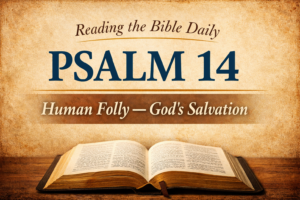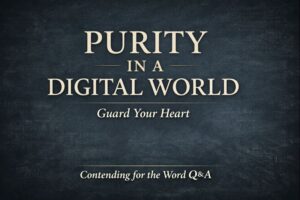⏱️ Estimated Reading Time: 3 min read
Guarding the Gospel in a Culture of Conspiracy Theories
Contending for the Word – · Written by Dave Jenkins
A Culture Obsessed with Secrets
From social media threads to documentaries, conspiracy theories are everywhere. Some are silly. Others are sinister. Many claim to reveal hidden truths behind world events, political powers, or even church movements. In a world full of lies and deception, it’s easy to see why people get drawn in.
This raises an important question: Should Christians care about conspiracy theories?
What the Bible Says About Truth
Scripture gives us a clear foundation. Jesus prayed, “Sanctify them in the truth; your word is truth” (John 17:17). Paul commands believers to “put away falsehood” and “speak the truth with our neighbor” (Ephesians 4:25). God is not the author of confusion (1 Corinthians 14:33). The gospel itself rests on revealed, historical truth—Christ’s death, burial, and resurrection (1 Corinthians 15:1–4). Christians are called to live in the light of God’s Word, not the shadows of rumor or speculation.
Why Conspiracy Thinking Is Dangerous
- It distracts from the gospel. Chasing secret plots can eclipse Christ’s mission (Matthew 28:18–20).
- It feeds fear instead of faith. Sensational claims often produce anxiety, not prayerful trust (Philippians 4:6–7).
- It undermines witness. Repeating unverified claims damages credibility before a watching world (Colossians 4:5–6).
- It can divide the church. Scripture warns against speculative controversies that stir quarrels, not godliness (2 Timothy 2:23; Titus 3:9).
Does This Mean Christians Should Be Naive?
No. The Bible warns about deception and corrupt powers (Ephesians 6:12). Biblical discernment is neither gullibility nor cynicism; it is wisdom anchored in God’s truth. Proverbs 18:13 cautions against speaking before understanding, and 18:17 reminds us that every story sounds true until it is tested. Wisdom requires patience, fact-checking, and humility.
What Christians Should Care About
- Proclaiming Christ, not paranoia.
- Living in the light of revealed truth—not in fear of the unknown.
- Trusting God’s sovereignty over history and rulers (Daniel 2:21; Proverbs 21:1).
Final Thoughts
We inhabit a confusing world of half-truths and hidden agendas, but our hope is not in uncovering every secret—it is in the God who sees all, knows all, and rules over all (Psalm 139:1–12). Instead of spreading speculation, let’s spread the gospel. Instead of fueling fear, let’s offer the peace of Christ. Truth matters—but not every theory is truth, and not every story is worth our energy. Let’s fix our eyes on what God has revealed and remain faithful to what truly changes lives—the Word of God and the gospel of Jesus Christ.
For more from Contending for the Word please visit our page at Servants of Grace and at our YouTube.
Dave Jenkins is happily married to his wife, Sarah. He is a writer, editor, and speaker living in beautiful Southern Oregon. Dave is a lover of Christ, His people, the Church, and sound theology. He serves as the Executive Director of Servants of Grace Ministries, the Executive Editor of Theology for Life Magazine, the Host and Producer of Equipping You in Grace Podcast, and is a contributor to and producer of Contending for the Word. He is the author of The Word Explored: The Problem of Biblical Illiteracy and What To Do About It (House to House, 2021), The Word Matters: Defending Biblical Authority Against the Spirit of the Age (G3 Press, 2022), and Contentment: The Journey of a Lifetime (Theology for Life, 2024). You can find him on Facebook, Twitter, Instagram, Youtube, or read his newsletter. Dave loves to spend time with his wife, going to movies, eating at a nice restaurant, or going out for a round of golf with a good friend. He is also a voracious reader, in particular of Reformed theology, and the Puritans. You will often find him when he’s not busy with ministry reading a pile of the latest books from a wide variety of Christian publishers. Dave received his M.A.R. and M.Div through Liberty Baptist Theological Seminary.




